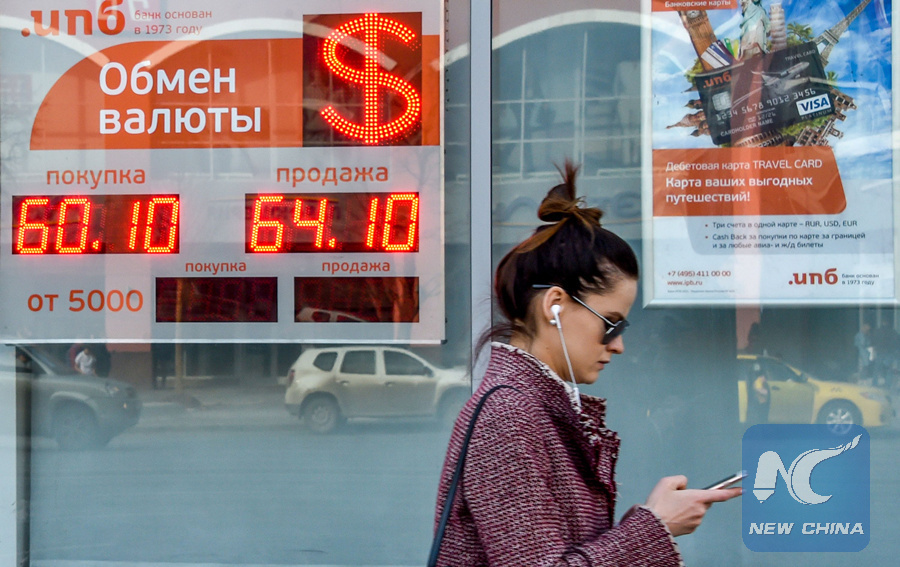
A woman walks past a currency exchange office in Moscow, on April 10, 2018. (AFP PHOTO)
MOSCOW, April 10 (Xinhua) -- Russian officials tried to appease market concerns on Tuesday as the country's stocks and currency dropped for the second day as a new round of U.S. economic sanctions against Russia start to bite.
"The Russian central bank has a wide range of instruments to act in different situations if there are risks of financial stability," Elvira Nabiullina, Russia's central bank chief, said at a stock exchange forum in Moscow.
"We do not see any such risks now. There is no need to use some systemic steps," she said.
The Russian currency, the ruble, was fixed at 62.7 against the U.S. dollar on Tuesday, further down from 59.1 on Monday and 57.9 on Friday, according to Moscow Exchange.
Russia's benchmark RTS stock index decline slowed down on Tuesday to less than 1 percent after a sharp fall of more than 11 percent on Monday.
The plunge in the financial market followed U.S. sanctions on Friday on 38 Russian individuals and entities, including seven business leaders and 17 senior officials, for their alleged "malign activity" around the world.
As a result of the punishment, all assets of the designated persons and entities that are subject to U.S. jurisdiction are frozen, and U.S. persons are generally prohibited from dealing with them.
"The Russian authorities will use all the necessary tools to minimize the consequences of the new sanctions and any other possible negative external events for both enterprises and the financial market," Russian Finance Minister Anton Siluanov said.
Russian Economic Development Minister Maxim Oreshkin also shrugged off concerns over the market slump, saying that the country's economy and financial market will definitely withstand the current volatility.
The downward pressure will serve as a "good test" for Russia's macroeconomic model that the government and the central bank have been creating for years, Oreshkin said at the stock exchange forum.
Nabiullina said the central bank is able to mitigate the impact of the weakening ruble on inflation as Russia's inflation now stands at around 2.4 percent, a quite low level in history.
"We see low inflation as one of the elements of maintaining macroeconomic stability, including under conditions of various external changes," Nabiullina said.
While saying the central bank will monitor the situation and will amend its policy if necessary, she expects the Russian economy and the country's financial sector to adapt to the new external conditions soon.
On Monday, Russian Prime Minister Dmitry Medvedev asked the government to work out proposals on supporting companies hit by the U.S. sanctions, including those in the metals, energy and defense sectors, as well as measures in retaliation to the U.S. move.

